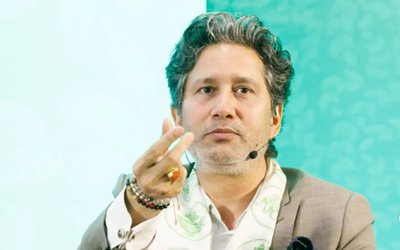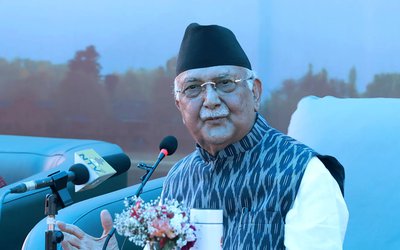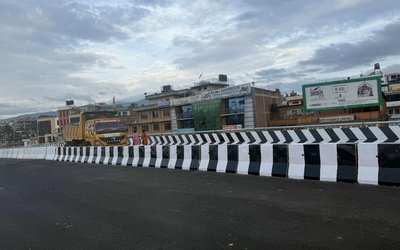More on News






Pushpa Kamal Dahal Prachanda has proved himself to be a good orator and someone used to speaking what others will want to hear. No one, who does that, can ever be a statesman or a respected leader. If Prachanda was feared all these years, it was not out of respect, but because he was the chief of a politico-military outfit that believed in annihilation of the ‘class enemy’ -- real, perceived or imaginary. The Unified Communist Party of Nepal-Maoist (UCPN-M) still has its combatants and military mind, but Prachanda seems to have outlived his utility. He could neither take the ‘armed insurgency’ to its logical conclusion, that is, capture of power, nor did he learn to trust the people –something a democratic leader must do—even after being elected by them as the largest party in the House. He spoke in favor of democracy, peace process and nationalism, but more often for tactical reasons. He seems to have realized now that while he can still fool his indoctrinated cadres, it is not possible to fool his colleagues and senior comrades.
There are clear signs that senior leaders like Baburam Bhattarai, Badal and Biplab are against him. Their assessment is clear: that Prachanda has outlived his utility, and he is now increasingly becoming counter productive. While these leaders’ anger against Prachanda is understandable, those opposing him are as vague and unclear as Prachanda is on the issue of nationalism, peace process and democracy. Nepalis have no evidence to suggest that one set of leaders is more nationalist than others. And Prachanda has of late realized that he is getting increasingly isolated within the party. His credibility as a leader is on the wane. “I am under siege. My own colleagues are speaking the language of enemies,” Prachanda said recently. “And all that for my having championed the cause of nationalism.”
Obviously, it was a painful moment for Prachanda to bring this ‘fact’ to the public. But this also calls for introspection on his part: has he actually ever acted like a nationalist except invoking nationalism at the time of crisis? He did so immediately after quitting the Prime Minister’s post in early May 2009 when he lost support of other political parties, and this time around because his senior colleagues in the party have challenged his leadership. Earlier, he blamed India for his exit from the post openly and this time, his insinuation is a bit vague and indirect. He is implying that those opposing him within the party ‘must be having the backing of the South’.
Maoists’ existence and strength lies in their powerful organization and programs and policies that are firmly injected in the minds of cadres. They invent external enemies as patron of ‘domestic puppets’
and target them physically as well as politically. The insurgency and conflict of the past one decade beginning February 1996 was fuelled by that ideology and belief. The leader—in this case Prachanda—was accepted as a dictator, a nationalist par excellence and anyone opposing him was taken as anti-people and anti-national. Baburam Bhattarai, the man who is pitted against Prachanda now himself, has heaped effusive praise on Prachanda as someone who is in possession of all the five leadership qualities: someone who identifies himself with the principles that the science of revolution based on Marxism, Leninism and Maoism requires, is identified with and champions the interest of the people and proletariats, and is always willing to go for self-criticism when needed. And Bhattarai is on the record many times as having said Prachanda has got all these qualities.
Cadres have been tutored on this for the umpteenth time. So when Prachanda says– by implication now —that he is under siege because he is a nationalist and communist, he can always turn the table on Bhattarai and his supporters within the party. His past and sin in having eulogized Prachanda will always hound Bhattarai. In democracy, hero-worship always weakens the cause of democracy and nationalism. But if Bhattarai and others in the UCPN-M are serious about finding an alternative to Prachanda for his politics of power and compromise, then they must tell the masses how they are going to be different from Prachanda. In Nepal’s context, consolidation and institutionalization of democracy will only be achieved if the Comprehensive Peace Agreement is sincerely implemented. Democracy can not be established without an independent judiciary. Is the ‘nationalist’ Prachanda ready to accept that principle? Is he willing to accept that he as Prime Minister and a ‘nationalist’ leader betrayed the right of the sovereign people to know the exact details about how ‘Bideshi prabhu’ (Foreign lords) were interfering with Nepal’s internal affairs. Why did Prachanda and the Maoist party that he led all these years hankered after external endorsement for turning Nepal into a Federal Democratic Republic without giving the people the right to decide on the issue?
Politics of power has tendencies to turn friends into foes and vice versa. That is what Prachanda has realized. But this is about time that political parties and the people asked the leaders to explain any
slogan—however, attractive and pro-people it may seem—to explain and elaborate. Perhaps it is about time that Prachanda explained his viewpoint on what constitutes nationalism, people’s supremacy, national independence and democratization of Nepal army. Nepal’s politics cannot move forward meaningfully without these issues bringing political parties together. Prachanda and Bhattarai will continue to wash their dirty linen in public, but all that at the cost of their revolutionary image and credibility. The fact that they seem to be falling apart will not come to their advantage.







